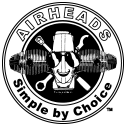New member looking for help choosing a bike
Hello,
Happy to be on the forum. I'm looking to get into the airhead community and have found a couple of good candidates, in particular one 1977 R75/7 and a 1982 R65, both in the 50-60k mi range. I live in New York and am a new rider so I'm looking for something not much above 450 lbs and below 1000cc.
The two bikes I've found have their pros and cons, so any advice at picking one or the other would be appreciated. The R75 I'm a little wary of because there's no maintenance records and little info about its past; at some point the front fork was swapped for a dual disc from stock. It's also been repainted, admittedly in a stunning but non-traditional color. The owner seems to have done some good work on it, including putting in a new clutch, I guess I'm wary of getting something with an unknown history. The R65 was bought by the current owner from a reputable dealer who had sold it to the original owner and maintained it. The owner said the main issue in his opinion was that the rear shocks are rough on bad roads.
Welcome to Airheads. I really like the 750 motor, but the R65 with a known history might be the better choice. You didn't indicate your level of mechanical capability, but a bike with a sketchy history needs a mechanically competent owner. I currently own an R80RT that fits into that category. Dual disc brake on the front is a plus. /7 bikes are the most refined of early (pre 1980) airheads. I do not have any experience with R65 bikes. A new set of rear shocks would be a simple, if not pricey undertaking. You are facing a tough choice there, John.
former Airmarshal, IL.
Welcome ! I would echo James' input.
My thoughts....
1) The Airhead is probably the best thing to ever come out of BMW design shops, and that includes the cars. Still, please realize you can't take a 1982 Chevy to a dealer and get service. And, it's the same with any other vehicle from 1982, including an Airhead. You've chosen Vintage and Classic motorcycles and you'll need to have your own covered storage and maintenance area. And even if you know of a local bike shop that can do the major work, you'll need to have a lot of mechanical aptitude and a LOTS of tools. There's simply no way you can afford all the hourly fees for simple things like oil and filter changes, checking tire pressures, cable lubrication, etc.
2) The R65 is going to have the newer suspension and braking system, which would be a huge advantage for a new rider. The Brembo brakes are much, much better than the older ATE stuff from the 1970's.
3) For a new rider it's important to understand that 3/4 of all motorcycle accidents, even if you are doing EVERYTHING right, are caused by cars turning in front of you (from 10 o'clock to 1 o'clock position). (Please read the "Hurt Report".) For this reason I would warn you before getting on the public roads to: A) take a rider safety course, B) fit a "headlamp modulator" to your bike [legal in all 50 states], and C) make sure all your riding apparel and helmet are high-viz colors.
As one who successfully navigated the Atlanta area for 50 years without an accident, that's the very best advice I can give you. From this initial contact we can dig further into any details you'd like. There's a lifetime of learning ahead of you on each of the subjects of maintenance, riding habits, motorcycle control, seating position, clothing/riding gear, etc. Text me and I'll send you a free summer riding jacket as my contribution to your riding safety and continued good health.
All the best !
Owning an old Airhead is easy.
Keeping an old Airhead running great is the true test.
My first BMW bike was the R75/7. I loved that bike and quite possibly if it had electronic ignition, brembo brakes and the wonderful BMW RT or RS fairing for the 77 to 95 era bikes, I would still be riding it.
I traded mine in for an 83 R80RT, the reason for the trade, the RT had better brakes, a super looking fairing (not as pretty as an RS but close) and it didn't have points in the ignition. A deer killed that bike, and I bought a 84 R80RT and have been riding it since it was new in late 84.
All that aside, I have to say as Richard writes, you most likely will have to do the majority of your own work to keep the bike in tune and riding properly. That is going to happen with both the bikes your are looking at, however, unless the points in the R75 have been replaced with an aftermarket electronic system, you have one extra tune up item to deal with.
My experience with points has been great when they are new and adjusted, sadly, the rubbing block no matter how well lubricated wears and gap changes, along with it timing changes. LOL, in my case, this always happened a long way from home and after a couple of episodes of crawling around hotel parking lots fiddling with out of adjustment points turned me into an avid get rid of the dang things advocate. If you are only going to do short trips from home, this is not a problem, but, I would still prefer the R65 if it has the electronic set up. So far I have had 40 some years with out any issues due to ignition failure at 235,000 miles.
Blab blab blab, LOL, I would agree that a bike with history is far better than on without. I and my friend in his airhead shop have seen too many used bikes come to be worked on that had what I call Previous Owner's Disease. Things that either owners neglected to do such as regular oil changes, or worse yet fixing things they didn't know how to fix, followed by "modifications" done that should not have been done or done wrong.
In the latter case, before you buy the R75, look it over VERY close to see the dual brake conversion was done correctly and by that I mean that the proper master cylinder was used. I worked on an acquaintance's bike that had forks changed and low and behold the guy that did the job used the wrong hardware causing himself a problem which he then unloaded on the next owner.
Now I have never ridden an R65, but from what I have heard is they are not quite as powerful as the 75, of course this is only an issue depending on how you are going to ride it and what you expect, the R65 will run all day without a fuss, but won't pass a car without a little more work.
Yeah I know, I wrote a novel, sorry. Good luck and good hunting. where are you in New York? St.
Beware! I do not suffer fools gladly! St.

I'm not nearly as knowledgeable or experienced as the above folks but I have owned my R65 LS for close to 15 years and last year I added an R100 RS. I'm reasonably mechanically inclined so basic maintenance is not a problem for me and I'm able to keep things running well enough. That being said some of the above posters and others have beanery helpful to my questions on this forum. I rode my R65 from Newfoundland to Tennessee and back at 75 mph the whole way with no real issues so yeah you can run as far as you want.
I agree with above, make sure you get good rider training. Spend the $$ for good equipment from head to toe.
As a survivor of three accidents, I am a AGAT guy, full face helmet, back pad the whole nine yards, put on just for a short ride. LOL, I may not be good looking but full face helmets have saved me damage to face, teeth and jaw twice now. St.
Beware! I do not suffer fools gladly! St.
Thanks everyone for the advice. In terms of rider training, I took the MSF course and will do another skills lesson once I've decided on a bike. As a long time NYC cyclist with a couple of bad accidents I take safety very seriously. The headlight modulator seems like a great idea. Richard, I don't know much about Atlanta admittedly (I've heard the Clermont Lounge is a lot of fun...) but I know enough to know that your traffic is terrible, and we're often graced here with Georgia drivers--who all seem to be practicing for F1--so it's quite impressive you've been okay for all these years.
I don't have experience working on motorcycles but am to borrow Mike's phrase "reasonably mechanically inclined". Thankfully, I have friends who are enthusiasts who have a garage and are generally helpful, although none of them ride Beamers.
The advice here seems to align with my intuition that I should make things as easy as possible on myself at the start, and the newer bike seems to be the way to go in that respect. A bike that has issue after issue is not going to be a good way to learn to be competent with repairs. And as Steven says, the technological advances of five years will help make the newer bike easier to maintain in general. The '82 owner did call me today to let me know that he took it out today and it rode well but the front brake felt "spongey". He bled the lines but another airhead owner told him he thought it was likely the master cylinder needs to be rebuilt. I appreciated his candor! I'll check it out on Wednesday.
Posted by: @john-wolfeThe '82 owner did call me today to let me know that he took it out today and it rode well but the front brake felt "spongey". He bled the lines but another airhead owner told him he thought it was likely the master cylinder needs to be rebuilt. I appreciated his candor! I'll check it out on Wednesday.
Ah, "spongey" is not needing a rebuild... Leaking is a rebuild. Spongey means that air is in the system. Theoretically, fluids are incompressible, but air is another matter. For some reason, BMW insists on routing the front brake hose all around under the tank, which creates "high spots" in the piping. Air collects in those high spots and can't get out. All other motorcycle brands run the hose vertically from the caliper to the m/c, which makes them self-bleeding. (This since air in the caliper eventually finds its way to the hose and then ends up being expelled in the m/c.)
30 minutes and a can of brand new DOT4 brake fluid will fix that. One of those brake fluid pumps wouldn't hurt either. Pumping new fluid in from the bottom usually works better on these systems.
► With a mind to do everything possible to improve the braking, I would highly recommend that you also...
1) Replace the flexible brake hose(s) at the same time. The OEM hoses fail all the time. While you have all the old fluid out is a great time to install modern, high efficiency hoses. (Read THIS.)
2) Replace the OEM brake pads with some modern compound pads from EBC. Brake pad technology has advanced since those OEM pads were installed.
Hope this helps.
Owning an old Airhead is easy.
Keeping an old Airhead running great is the true test.
Richard makes a good point regarding replacing the brake lines. While the bike may have low miles, it is old and the lines could be shot.
Then again, stainless lines make a bit of a noticeable difference in brake action. This makes the cost of changing to them worth it.
LOL, once you pull out the old lines and install the new ones, you will get a first hand knowledge on bleeding brakes.
A tip, you must ensure that when you open the bleeder, there is pressure on, just open it in a snap open close, just enough to see a bubble or fluid. Keeping the bleeder open too long will let air back in when the brake lever has bottomed out, unless you are using a vacuum bleed system.
Also, make sure ALL painted parts are protected from brake fluid. St.
Beware! I do not suffer fools gladly! St.
I have been thinking about what I wrote earlier and want to clarify a bit.
While bleeding brakes it is essential the bleeder is only open while pressure is being applied to the lever. so by snap open and shut I mean only open the bleeder while steady pressure is applied, try hard to get the bleeder closed before the lever hits bottom. Don't pump the lever while the bleeder is open. St.
Beware! I do not suffer fools gladly! St.
- 27 Forums
- 1,952 Topics
- 11.1 K Posts
- 3 Online
- 11.9 K Members





